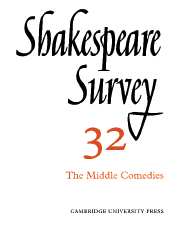Book contents
- Frontmatter
- Shakespeare’s Middle Comedies: A Generation of Criticism
- ‘Perfect Types of Womanhood’: Rosalind, Beatrice and Viola in Victorian Criticism and Performance
- The Stage Representation of the ‘Kill Claudio’ Sequence in Much Ado About Nothing
- As You Like It Adapted: Charles Johnson’s Love in a Forest
- Social Relations and the Social Order in Much Ado About Nothing
- Sexual Disguise in As You Like It and Twelfth Night
- Twelfth Night and the Myth of Echo and Narcissus
- ‘Smiling at grief’: Some Techniques of Comedy in Twelfth Night and Così Fan Tutte
- ‘My Lady’s a Catayan, we are politicians, Maluolios a Peg-a-ramsie’ (Twelfth Night II, iii, 77-8)
- The Importance of Being Marcade
- A Hebrew Source for The Merchant of Venice
- The Marriage Contracts in Measure for Measure: A Reconsideration
- Richard III: Antecedents of Clarence’s Dream
- Deep Plots and Indiscretions in ‘The Murder of Gonzago’
- ‘What is’t to leave betimes?’ Proverbs and Logic in Hamlet
- The Tempest: Language and Society
- Pictorial Evidence for a Possible Replica of the London Fortune Theatre in Gdansk
- A Year of Comedies: Stratford 1978
- The Year's Contributions to Shakespearian Study: 1 Critical Studies
- 2 Shakespeare’s Life, Times and Stage
- 3 Textual Studies
- Index
- Plate section
The Importance of Being Marcade
Published online by Cambridge University Press: 28 March 2007
- Frontmatter
- Shakespeare’s Middle Comedies: A Generation of Criticism
- ‘Perfect Types of Womanhood’: Rosalind, Beatrice and Viola in Victorian Criticism and Performance
- The Stage Representation of the ‘Kill Claudio’ Sequence in Much Ado About Nothing
- As You Like It Adapted: Charles Johnson’s Love in a Forest
- Social Relations and the Social Order in Much Ado About Nothing
- Sexual Disguise in As You Like It and Twelfth Night
- Twelfth Night and the Myth of Echo and Narcissus
- ‘Smiling at grief’: Some Techniques of Comedy in Twelfth Night and Così Fan Tutte
- ‘My Lady’s a Catayan, we are politicians, Maluolios a Peg-a-ramsie’ (Twelfth Night II, iii, 77-8)
- The Importance of Being Marcade
- A Hebrew Source for The Merchant of Venice
- The Marriage Contracts in Measure for Measure: A Reconsideration
- Richard III: Antecedents of Clarence’s Dream
- Deep Plots and Indiscretions in ‘The Murder of Gonzago’
- ‘What is’t to leave betimes?’ Proverbs and Logic in Hamlet
- The Tempest: Language and Society
- Pictorial Evidence for a Possible Replica of the London Fortune Theatre in Gdansk
- A Year of Comedies: Stratford 1978
- The Year's Contributions to Shakespearian Study: 1 Critical Studies
- 2 Shakespeare’s Life, Times and Stage
- 3 Textual Studies
- Index
- Plate section
Summary
Den Gott des Ganges und der weiten Botschaft,
die Reisehaube u'ber hellen Augen,
den schlanken Stab hertragend vor dem Leibe
und flugelschlagend an den Fussgelenken.
It is a disconcerting fact that what nowadays appear to be the main problems attaching to Loves Labour’s Lost arise out of ill-advised attempts, over the past hundred years, to attribute to Shakespeare a rather uncharacteristic preoccupation with satirical allegory whose interpretation has produced a diversity of mutually antagonistic hypotheses. Once we accept that these major problems may be nonexistent and the minor ones, though insoluble, negligible, the residue is a straightforward, intensely vigorous yet gently sardonic comedy; a tour-de-force in which Shakespeare is able, through sheer technical dexterity, to sustain a dialogue involving no less than eight characters, of whom two or three are sufficiently heightened for the initiative to shift hither and thither and from whom there emerges a comic hero, Berowne, whose vitality surpasses that of any of his successors, Benedick alone excepted.
- Type
- Chapter
- Information
- Shakespeare Survey , pp. 105 - 114Publisher: Cambridge University PressPrint publication year: 1980

